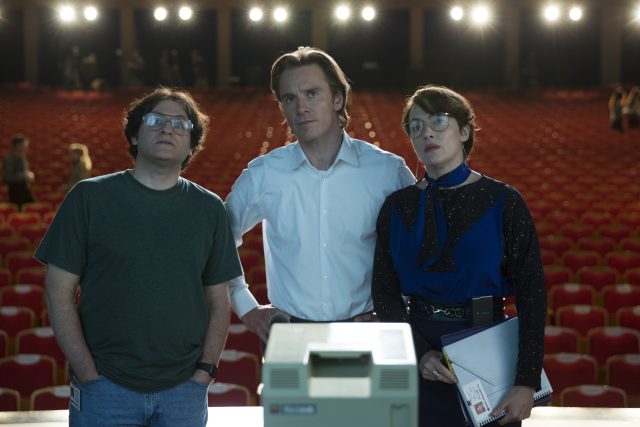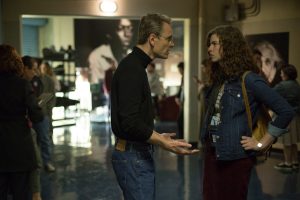
In 2004, I acquired my first Mac. It was an iBook laptop, slightly boxy and all white. To say that I was excited to own an Apple product is an understatement. I spent most of my teenage years coveting friends’ colorful iMac G3s while I went home to a modest eMachines PC that froze and required restarts several times a day. Mac computers never seemed to crash as much as the PCs I grew up with; plus, they looked cool. The latter point is key to the company’s success. Apple has built a culture (some would shorten that to cult) around the aesthetic and hype of their products.
The iMac that I coveted so much in my teenage years was launched in 1998, a turning point at Apple following Steve Jobs’ return to the company that he co-founded. It is at this moment in Apple history that the new film Steve Jobs—based on the Walter Isaacson biography of the same name—closes on. The launch of the 1998 iMac is the last of three launch events the film is structured around; the others are the 1984 Mac and the 1988 NeXT cube. We never see the iPod, iPhone, or iPad (although there are hints of some of these products sprinkled in the film), but that’s fine. In this film, the products aren’t really the focus.
Steve Jobs is directed by Danny Boyle (127 Hours, Slumdog Millionaire) and written by Aaron Sorkin (West Wing, The Social Network). That should tell you what kind of film this is. Expect a story where the main characters face some kind of obstacle and dialogue that's faster than your brain can process. Steve Jobs seems to start rather abruptly, with a group of people hunched over a computer trying to figure out how to make it say “hello”. Yep, this is the 1984 launch event, and we are immediately introduced to important players on the Mac team: Steve Jobs (Michael Fassbender), Joanna Hoffman (Kate Winslet—who is brilliant in this role), and Andy Hertzfeld (Michael Stuhlbarg). We also meet Steve Wozniak (Seth Rogen), John Sculley (Jeff Daniels), and other characters who were a part of shaping Apple in the ‘80s and ‘90s.

Again, this is a film about relationships, but the main one doesn't involve these primary characters of the Mac team. Steve Jobs is largely interested in the dynamic between Jobs and his first daughter, Lisa Brennan-Jobs. Jobs infamously denied that he was Lisa’s father for many years despite a positive paternity test, telling TIME Magazine in 1983 that “28 percent of the male population of the United States could be the father.” This line is cited in the film by Job’s former girlfriend and Lisa’s mother, Chrisann Brennan (played by Katherine Waterston). In the film, Jobs retorts that he was using an algorithm that came up with that number. In another scene, Jobs tells his daughter, who is five years old at the time, that it’s just a coincidence that the Lisa computer shares her name. Ouch.
It’s not surprising that this film shows Jobs' cold, seemingly emotionless side. Remember, this is a screenplay by the same man who wrote The Social Network, which also showed a less-than-flattering portrait of another Silicon Valley tech leader (Mark Zuckerberg). It also makes sense from a film perspective; a person who is always nice and does the right thing is not a very interesting person to profile. Just like in Social Network, we have to view all scenes in Steve Jobs as part fact, part fiction. Some moments paint Jobs in an unflattering light, but he ultimately comes away as a complicated, difficult man with a good heart. And like Boyle's most famous films, everything seems to work out for the main character by the end. Jobs restores his relationship with Lisa, and he is on top at Apple again.
Following a Friday night screening of the film that Ars attended in San Francisco, Boyle and Sorkin did a Q&A and took questions from the audience. Sorkin addressed the issue of taking broad brush strokes when covering a well-known person like Jobs, saying that he didn’t think any of the scenes he created did harm to the image of Jobs or to the people represented in the film who are still alive. When Sorkin was asked what Jobs might think about the film if he were alive today, Sorkin said, “If this movie were about someone else, he’d like it.”
Sorkin also talked about the fact that Fassbender doesn't exactly resemble Jobs. And no one really tries to make the actor look like Jobs, which is refreshing at a time when prosthetics and heavy makeup are used widely on film. Fassbender does start to look like Jobs at the end of the film, at the 1998 iMac product launch for example, probably because he is in a uniform that people remember very well: glasses, a black turtleneck tucked into jeans, and sneakers.
Even if he never appeared on film dressed as such, Fassbender would be believable as Jobs. He is consistently strong in leading roles and has a track record of playing complicated men (Edward Rochester in the latest adaptation of Jane Eyre and Edwin Epps in 12 Years a Slave, to name a couple). The actor has a certain intense quality that is needed for polarizing characters; I couldn't imagine someone doing a better job in this role.
Winslet, who luckily gets a lot of screen time given Sorkin's track record with female characters, is also great. Her character, Joanna Hoffman, is probably best known for standing up to Jobs in real life. In the film, she argues with the main character and keeps him on track in the minutes leading up to the various product launches. None of the women in the Social Network had prominent roles, so it was great to see Sorkin changed that for Steve Jobs. (Jobs' daughter Lisa also has a prominent role throughout, though she is played by different actresses during the different years that the film portrays.)
Going into the film, I didn't think I would like it very much. Sorkin’s dialogue can be exhausting at times and his characters can sound like different versions of the same person (see Sorkinisms). But the dialogue in Steve Jobs, while unsurprisingly fast-paced, was smooth with several humorous moments. For instance, there is a running bit between Jobs and Wozniak where every time Wozniak says, “computers aren’t art,” Jobs responds, “fuck you.”
So this movie is generally likable (perhaps helped by the fact that Fassbender, Winslet, and the rest of the cast are likable actors), and as someone who is tired of epic biopics that span from a person’s childhood to death, I enjoyed the tidy, breezy structure of the film. Using the product launches as backdrops to the story is particularly smart. These events are still grandiose, overly-hyped events even today, meaning everyone has a context for product launches no matter what generation they were born into.
Despite how he believes the famed CEO would react, Sorkin ultimately sides with his title character. "Fuck you." Steve Jobs suggests that Apple computers are a form of art—and that Jobs himself was an artist who should be celebrated despite the flaws.
Steve Jobs is in select theaters now with a wide release scheduled for October 23.
reader comments
82